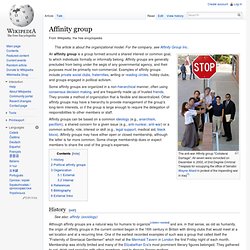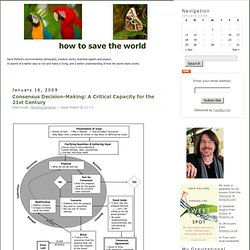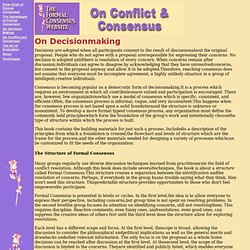

Learn Nonviolent Communication. Rational consensus. Members of the Shimer College Assembly reaching a consensus through deliberation.

Consensus decision-making is a group decision-making process that seeks the consent of all participants. Consensus may be defined professionally as an acceptable resolution, one that can be supported, even if not the "favourite" of each individual. Consensus is defined by Merriam-Webster as, first, general agreement, and second, group solidarity of belief or sentiment. It has its origin in the Latin word cōnsēnsus (agreement), which is from cōnsentiō meaning literally feel together.[1] It is used to describe both the decision and the process of reaching a decision. Consensus decision-making is thus concerned with the process of deliberating and finalizing a decision, and the social and political effects of using this process. Objectives[edit] As a decision-making process, consensus decision-making aims to be:[2] Alternative to common decision-making practices[edit] Historical examples[edit]
Consensus decision-making. Affinity group. The anti-war Affinity group "Collateral Damage".

All seven were convicted on December 4, 2002, of 2nd Degree Criminal Trespass for occupying the office of Senator Wayne Allard in protest of the impending war in Iraq[1] An affinity group is a group formed around a shared interest or common goal, to which individuals formally or informally belong. Affinity groups are generally precluded from being under the aegis of any governmental agency, and their purposes must be primarily non-commercial.
Examples of affinity groups include private social clubs, fraternities, writing or reading circles, hobby clubs, and groups engaged in political activism. Some affinity groups are organized in a non-hierarchical manner, often using consensus decision making, and are frequently made up of trusted friends. History[edit] Political affinity groups[edit] Affinity groups engaged in political activism date to 19th century Spain. Organization[edit] External[edit] Consensus: Critical for the 21st Century. Consensus flowchart by tree bressen In our modern society, there are five distinct ways that decisions get made.

Each entails power dynamics, and make no mistake: Decision-making is all about the exercise of power. Here’s a snapshot: There is evidence that, prior to the advent of civilization and overcrowding, when resources were abundant and accessable to all, society was largely anarchic: that is, individuals (even within tribes) made their own decisions and lived with the consequences. At the local level in anarchic societies, with no regulatory system to prevent it, bullying by psychopaths could occur, but in a world of abundance individuals were free to leave the influence of such bullies at will.
As the world became more crowded, abundance gave way to scarcity and stable tribes and communities became increasingly transient. I’m a theoretical anarchist. A Guide to Formal Consensus. Decisions are adopted when all participants consent to the result of discussionabout the original proposal.

People who do not agree with a proposal areresponsible for expressing their concerns. No decision is adopted untilthere is resolution of every concern. When concerns remain after discussion,individuals can agree to disagree by acknowledging that they have unresolvedconcerns, but consent to the proposal anyway and allow it to be adopted.Therefore, reaching consensus does not assume that everyone must be incomplete agreement, a highly unlikely situation in a group of intelligent,creative individuals. Consensus is becoming popular as a democratic form of decisionmaking.It is a process which requires an environment in which all contributionsare valued and participation is encouraged.
This book contains the building materials for just such a process. The Structure of Formal Consensus Formal Consensus is presented in levels or cycles. Each level has a different scope and focus. 1. 2. 3. Jack Reeds - Consensus decision making. 02/08 by V RADIO. Follow Call in to speak with the host On this edition of V-RADIO we are happy to once again have Jack Reed of the Community Planet foundation to discuss consensus decision making.

We will be reading from his book and then discussing the essence of consensus decision making. Tags: Zeitgeist The Venus Project Green Party Libertarian Jacque Fresco h:17838s:1527177archived Recommended For You Comments.